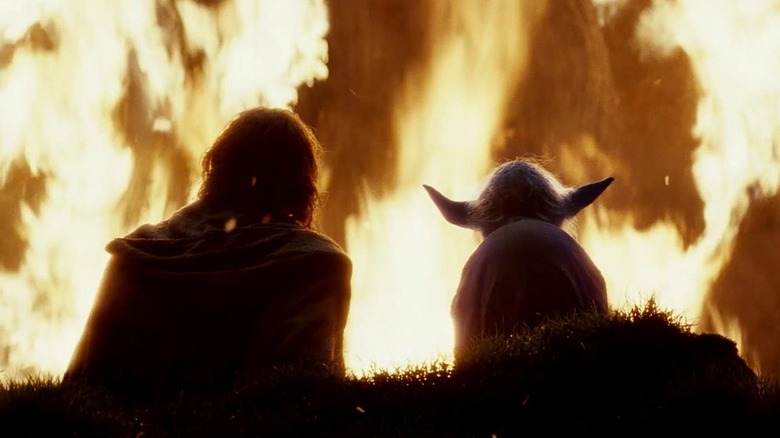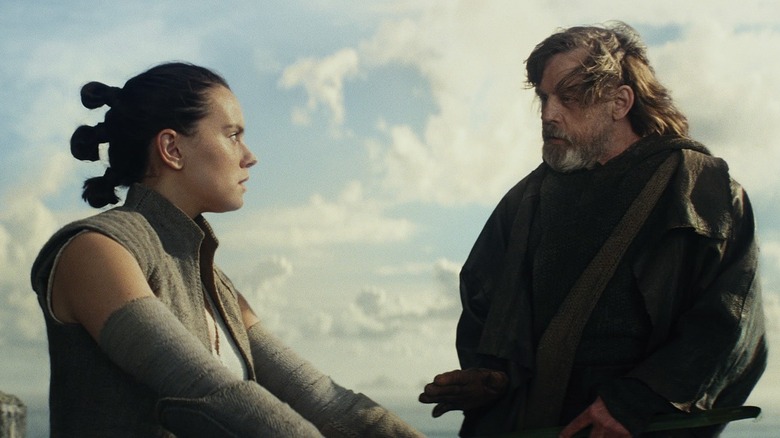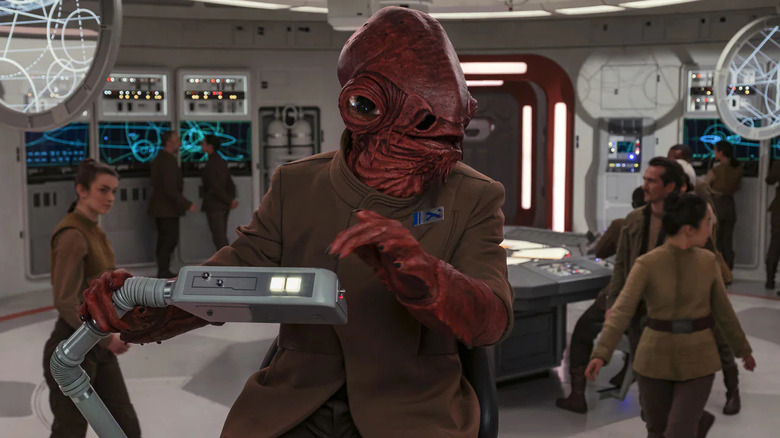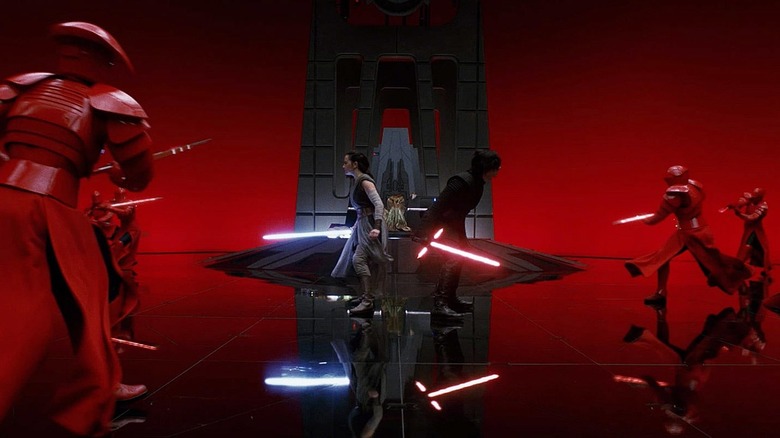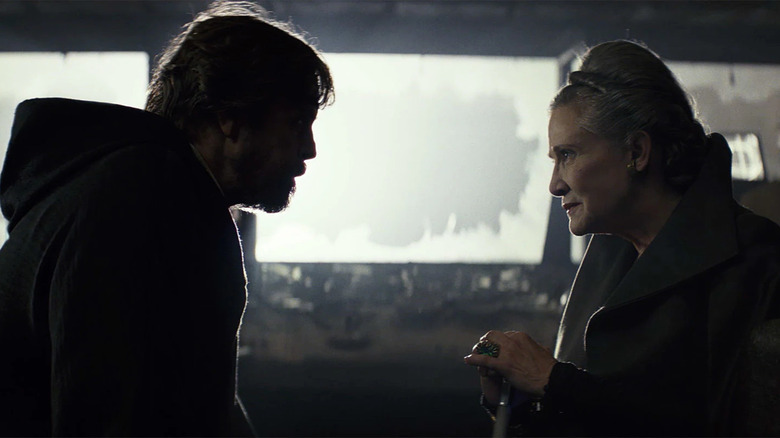Tales From The Box Office: The Last Jedi Changed Star Wars Forever (For Better Or Worse)
(Welcome to Tales from the Box Office, our column that examines box office miracles, disasters, and everything in between, as well as what we can learn from them.)
It is unlikely any movie ever made will recapture the straight-up fever that engulfed so many of us in the lead up to "Star Wars: The Force Awakens." It can be so hard to remember now, but there was a time where it felt like we were never going to get any more "Star Wars" movies and the prequels were going to be it. Then Disney purchased Lucasfilm and J.J. Abrams crafted a bona fide crowd-pleaser that, though nostalgic, also introduced us to brand new characters that a new generation of fans could care for. "Star Wars" was back and it felt bigger than ever.
Things got pretty damn interesting after the dust settled in early 2016, as many of us were eagerly awaiting the first standalone "Star Wars" movie, "Rogue One," which would go on to become a $1 billion hit. But the bigger concern was "Episode VIII," which we would come to know as "The Last Jedi." Directed by Rian Johnson, it picked up where "The Force Awakens" left off and, from a pure dollars and cents perspective, remains one of the biggest movies of all time. Yet, when looking at the larger picture, it also seemed to do irrevocable damage to the decision makers at Lucasfilm because, whether we like to admit it or not, this movie remains as divisive as any mainstream blockbuster ever made.
In honor of the movie's fifth anniversary this past week, we're looking back at "The Last Jedi," how it came to be, what happened in the aftermath of its release, and what lessons we might be able to learn from it several years removed. Let's dig in, shall we?
The movie: Star Wars: The Last Jedi
Disney paid more than $4 billion for Lucasfilm and, from the jump, it was clear the studio wasn't going to approach this by dipping a toe into the pool. The plan was to create an entirely new "Star Wars" trilogy, serving as sequels to George Lucas' original trilogy. Not only would we meet new characters such as Daisy Ridley's Rey, Adam Driver's Kylo Ren, and John Boyega's Finn, but the old gang would be back as well, with Harrison Ford, Carrie Fisher, and Mark Hamill returning as Han Solo, Leia Organa, and Luke Skywalker, respectively. So, by the time Abrams was busy filming "The Force Awakens," plans were well underway to get the follow-up moving in the right direction.
Ultimately, Lucasfilm President Kathleen Kennedy opted to give Rian Johnson, the director of "Looper," a call about the gig. Johnson (along with everyone else at the time) had merely assumed that Abrams would probably direct "Episode VIII" as well. Not so fast! After some deliberation, Johnson accepted the gig and set about writing the script.
That is a crucial element of this whole thing, as the filmmaker had his own ideas about where the story should go. We don't need to re-hash everything that happened in the wake of this movie's release but it's worth at least going over the larger points. Mainly, that Johnson had his own vision for this particular story — one that is beloved by many, serves as a mixed bag for many others, and is downright reviled by a certain vocal minority. Speaking in 2017 just ahead of the film's release, here's what he had to say:
"The fact that I would basically be able to write it from scratch in a way — obviously by continuing on from 'The Force Awakens' but getting to find my own story and write and direct it — was important. I know it's 'Star Wars,' it fits into a bigger picture. But it also feels as personal to me as any of the other films I've made."
Doing Star Wars the Rian Johnson way
One thing that has remained uncertain in the years since the release of "The Last Jedi" is whether or not a full outline of the sequel trilogy had been put in place by Lucasfilm and/or Abrams. Per Daisy Ridley's recollection in 2018, there very much was.
"J. J. wrote 'Episode VII,' as well as drafts for 'VIII' & 'IX.' Then Rian Johnson arrived and wrote ['The Last Jedi'] entirely. I believe there was some sort of general consensus on the main lines of the trilogy, but apart from that, every director writes and realizes his film in his own way. Rian Johnson and J. J. Abrams met to discuss all of this, although 'Episode VIII' is still his very own work. I believe Rian didn't keep anything from the first draft of Episode VIII."
Be that as it may, Johnson had his own plans, wrote a story of his own design, seemingly abandoning anything Abrams may or may not have laid out in his outline, and proceeded to unfold the middle chapter in this trilogy on his terms. Now, while it's certainly true that critics and a great many fans absolutely love what Johnson did with "The Last Jedi," what simply cannot be argued is that it ended up being divisive amongst general audiences.
I'm not talking about the vitriolic online trolls that forced Kelly Marie Tran to abandon social media. I'm talking about your average "Star Wars" fan, the average moviegoer. There is no denying that it's a mixed bag in regards to reception when compared to something like "The Force Awakens." Heck, even Hamill expressed his concerns with the direction Johnson took Luke Skywalker in the film. Be that as it may, "Star Wars" fever was running high and nothing could derail the money train that was coming, even if Lucasfilm was going to face unintended consequences after the fact.
The financial journey
Before diving into what "The Last Jedi" did, it's worth remembering that "The Force Awakens" was a once-in-a-lifetime sort of thing. It made an all-time record $936.6 million domestic on its way to $2 billion worldwide. Even against sky high expectations, it overperformed. It was never, ever likely that the sequel would see those same record-shattering numbers. But that does not mean making less is a disappointment, as any studio would be thrilled to have another one of the 20 highest-grossing movies ever in its catalog just two years later.
"Star Wars: The Last Jedi" opened in theaters on December 15, 2017, exactly two years after its predecessor. It did so with a bang, taking in $220 million, ranking to this day as the fifth biggest opening weekend ever domestically. The top three were all released after the fact, with "Avengers: Infinity War," "Spider-Man: No Way Home," and "Avengers: Endgame" currently occupying the top spots. So yeah, it was huge. Now, things change a bit with the second weekend, as the movie took a dive, falling 67.5%, bringing in $71.5 million in its sophomore outing.
Regardless, "The Last Jedi" held the top spot for five weeks and finished with a domestic total of $620.1 million, with a stellar international total of $712.3 million for a grand total of $1.33 billion, good enough to make it the 16th highest-grossing movie of all time currently. And seven of the movies above it came out in 2018 and beyond, meaning it was much higher up on the list for a time. In terms of raw dollars and cents, even with a huge budget said to be in the $260 million range, there was no denying that this made Disney's purchase of Lucasfilm look very wise.
Lucasfilm loses direction
The near-immediate aftermath of "The Last Jedi" was palpable, particularly for those who live their lives on social media. Whereas so much of the talk online was buzzy and warm following the release of "The Force Awakens," there was much bickering and heated debate about its follow-up. Did Johnson ignore everything that Abrams set up? Did fans only have themselves to blame for doing so much theorizing? Was Luke's arc beautiful or frustrating? We could go on and on (and on). It quickly became exhausting but, more to the point, impossible to ignore, particularly for those at Lucasfilm who seemed very high on the film ahead of its release. So much so that they announced a new "Star Wars" trilogy to be directed by Johnson that, five years later, seems to be going exactly nowhere.
There is, perhaps, no greater evidence that Lucasfilm took the response to "The Last Jedi" to heart than the fact that Johnson's trilogy has yet to materialize. Meanwhile, the studio suffered another blow when "Solo: A Star Wars Story" bombed a mere five months later in May 2018. From then on, Lucasfilm has seemed downright gunshy about the direction the studio should take as it relates to "Star Wars," seemingly paralyzed with indecision. Directors have been fired from major projects, starting with Colin Trevorrow from his radically different version of 'Episode IX,' only for Abrams to come in and finish what he started with the similarly controversial "The Rise of Skywalker." Meanwhile, we've had no "Star Wars" movies since, despite several entering development and falling by the wayside.
Yet, shows like "The Mandalorian" have taken off on Disney+, causing Lucasfilm to pivot to TV, with "Obi-Wan Kenobi" becoming a show even though it was originally planned as a movie. Something similar happened with "The Book of Boba Fett," and both of those arrived with mixed results. It has been, to say the very least of it, a mixed bag over the last five years, as we've only really scratched the surface of what's gone on at Lucasfilm during that time. It's been hectic.
The lessons contained within
So what might we be able to learn from "Star Wars: The Last Jedi," five years removed? To be fair and show my hand here, I have been mixed on the film from day one, absolutely loving parts of it, and strongly disliking others. But I love "Star Wars" with all of my heart and it was so sad to see the conversation around this movie devolve the way it did. Heck, a bunch of idiots even tried to raise money to remake the film, a gag Johnson acknowledged and signed off on, as he has taken absolutely every ounce of toxicity in stride like a f****** champ.
As I've argued before, it's high time we stop letting this vocal minority (because let's be clear, that's what they are) ruin "Star Wars." Plain and simple, no matter how one feels about this movie, the discourse sucked the fun out of it in many ways and we just need to get back to a place where that isn't front-and-center. Beyond that, from a studio perspective, I think it's crystal clear to me that the trilogy was mishandled. At what point did it all go wrong? We can argue about that for years (and we probably will).
My 2 cents? It probably would have been best to lay out a rough story plan for the trilogy, and stick to that plan as best as possible. Come what may have come, Lucasfilm wouldn't have been caught in the trap they wound up caught in. They wouldn't have had to "respond" to the fans with "The Rise of Skywalker" like they did. They wouldn't have all but abandoned "Star Wars" movies for years while trying to figure out how best to proceed. When hatching ambitious plans, those plans need to be ironed out well enough to help ensure success in every way possible. The independent nature of the trilogy, with Abrams, Johnson, and Trevorrow trying to tackle those stories as they saw fit, clearly wasn't the way to go. "Star Wars" hasn't been the same since and, for better or for worse, it was "The Last Jedi" that remains a crystal clear "before and after" dividing line in the sand.
